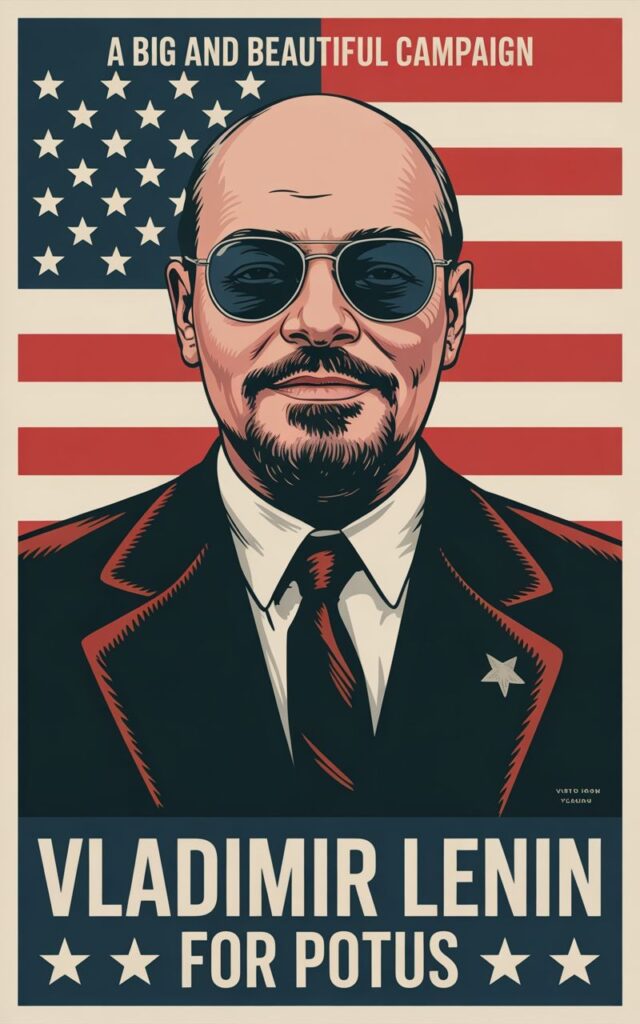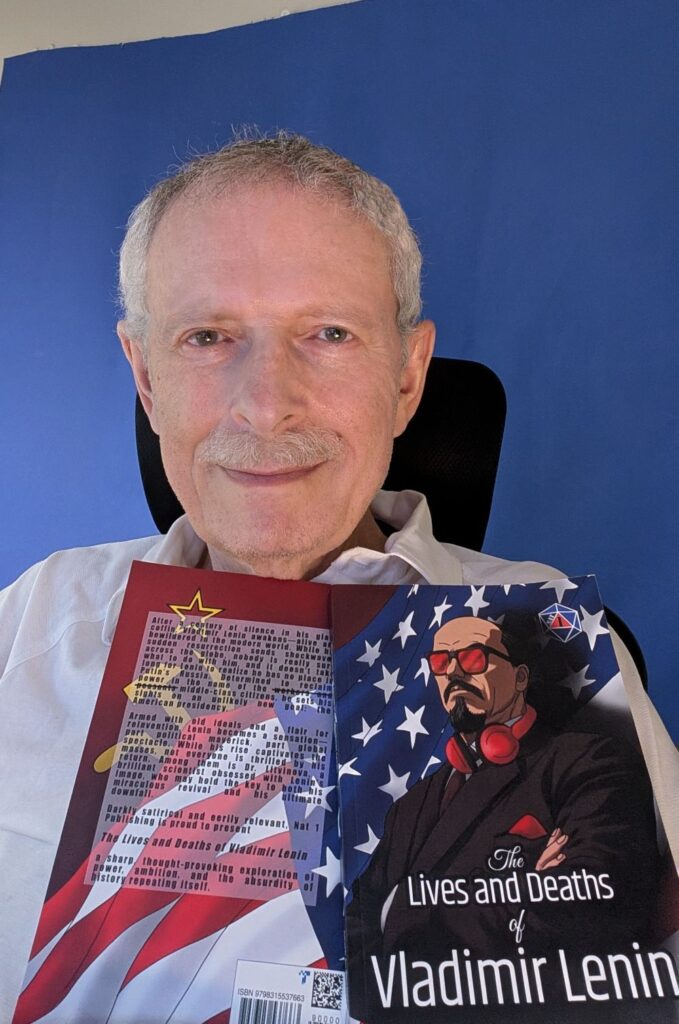Dear friends,
I’m humbled and excited to share the news that my novel, The Lives and Deaths of Vladimir Lenin, was published by Nat 1 Publishing in July of 2025.
After a century of brooding and talking telepathically to his Mausoleum janitor from his glass coffin, Vladimir Lenin awakens—alive and bewildered in the modern world. While his sudden resurrection sends shockwaves across the globe, nobody is really sure what to do with him, and it doesn’t take long for Lenin to realize he has no place in Putin’s Russia. Determined to reclaim power in the name of the workers and peasants—erm, middle-class citizens—he sets his sights on an unlikely new goal: the American presidency. As for Article II, Section 1, Clause 5 of the US Constitution. “No Person except a natural-born Citizen shall be eligible to the Office of President,” let his supporters take care of that.
Armed with old ideals and a flair for reinvention, Lenin becomes a sensation—part political maverick, part global spectacle. While his rise captivates the masses and brings on board of his election committee American billionaires and ordinary mortals attracted to him like a moth to the flames, not everyone is thrilled by his resurrections. Among them is Dr. Litvinova, a brilliant scientist obsessed with Lenin’s image, who may hold the key to both his miraculous revival and his ultimate downfall. But Lenin is a new and old phoenix. He emerges from ashes again and again and burns others to ashes in the process.
I grew up in the shadow of Lenin back in the Soviet Union. That novel was in the making my entire life, or at least since I learned how to write.
The newest reviews:



You can order the Kindle or print version here.



Holding my books.
Endorsements
“This book sounds wild, and timely.”
——Aimee Margot Bender, author of The Butterfly Lampshade, Knopf
“A new player has taken the stage — and not just any stage, but the grandest of all: the Oval Office. Fresh from his glass box in Red Square, Lenin has traded embalmed eternity for executive power. Yes, that Lenin — Vladimir Ilyich himself. Being slightly dead is no obstacle; he’s sharper (and funnier) than half the living presidents combined. In LIVES AND DEATHS OF VLADIMIR LENIN, Mark delivers a dark comedy that speaks less to Lenin’s time than to ours — and to the future he inhabits in the novel.”
——Julia Nemirovskaya, Poet, Writer, and Senior Instructor in Literature, University of Oregon.
“There is a new force in town. Washington D.C., that is. He exchanged his open coffin in the Red Square Mausoleum for the executive chair in the Oval Office. His name is Lenin. Vladimir Lenin. So what if he’s a little bit dead? He still can do better than most of his POTUS predecessors. If you don’t think so, think again. Mark’s dark comedy LIVES AND DEATHS OF VLADIMIR LENIN is 25% hilarious, 25% sad, 25% prognostic, 25% mysterious and 100% entertaining.”
——Nina Kossman, editor of Eastwest Literary Forum, a bilingual literary magazine in English and Russian
“Budman weaves a wild and entertaining surrealistic tale of a reanimated Vladimir Ilyich Lenin, coming back from the dead to make a run for the Presidency in the most unlikely of places, the United States of America. Lenin attracts a disparate band of sycophants who guide, and misguide, him through the political landscape of the 21st century. With a pinch of Bulgakov, and a dash of Gogol, Budman pulls off, in high style, a classic piece of Russian (and American) satire.”
——Bill Burkland – Author of the Award Winning Novel, The Misconceived Conception of a Baby Named Jesus
The opening:
Chapter One
On the evening of January 21, 1924, Vladimir Ilyich Lenin was busy dying. The bog of unconsciousness kept sucking him in, filling up his mouth and nose with corrosive muck the color of the Soviet flag. After much hand and leg flapping, he would resurface, but each time he remained under longer and longer, and each time the burning became more intense.
A squad of his closest comrades, a platoon of doctors, a company of nurses, and a battalion of Latvian rifles, the Bolsheviks’ most loyal troops, surrounded Lenin’s bed in concentric circles in a suburb of Moscow. He, the Chairman of the Council of People’s Commissars, the founder of the Soviet Union, the beacon for mankind, was the stone thrown in a pond, and they were the ripples. He was the summit, and they were the surrounding hills. He was the sun, and they were his rays.
The comrades sighed and whispered. The doctors and nurses injected him, massaged him, fed him pills and tinctures, and measured his temperature. The guards declared, albeit with a Latvian accent, their willingness to sacrifice their collective life for Lenin. They ground their teeth and clutched their rifles so their knuckles turned the same color as their mortal enemies: the counter-revolutionary White Guards.
Nothing helped. The bullets of Fanya Kaplan, that hysterical maiden, that Social Revolutionary party terrorist, had brought irreparable damage to Lenin’s formerly handsome, well-built, and invincible body.
Perhaps Fanya mistook him for another incarnation of the Czar or his prime minister. Perhaps she dreamed of martyrdom, a concept as outdated as smelling salts for her kind. Lenin couldn’t see anything wrong with shooting or blowing up a few overly oppressive bourgeois leaders, in moderation, of course. But killing Lenin? A catastrophe! Workers and peasants all over the planet needed him—the light of the
world. The poet Mayakovski said, “He carried a billion and a half people in his skull.” Or how Lenin himself wrote in his diary coming home from kindergarten: “If diseases offend the body, then death displeases the mind.”
Who would dare to shatter Lenin’s magnificent skull and spill this multitude of people?
Yet that was exactly what the terrorist did. First, she offended, and now was about to spill and displease. She took Lenin’s health away and forced him to leave the workers and peasants alone in the dark and move into nothingness.
My interview.